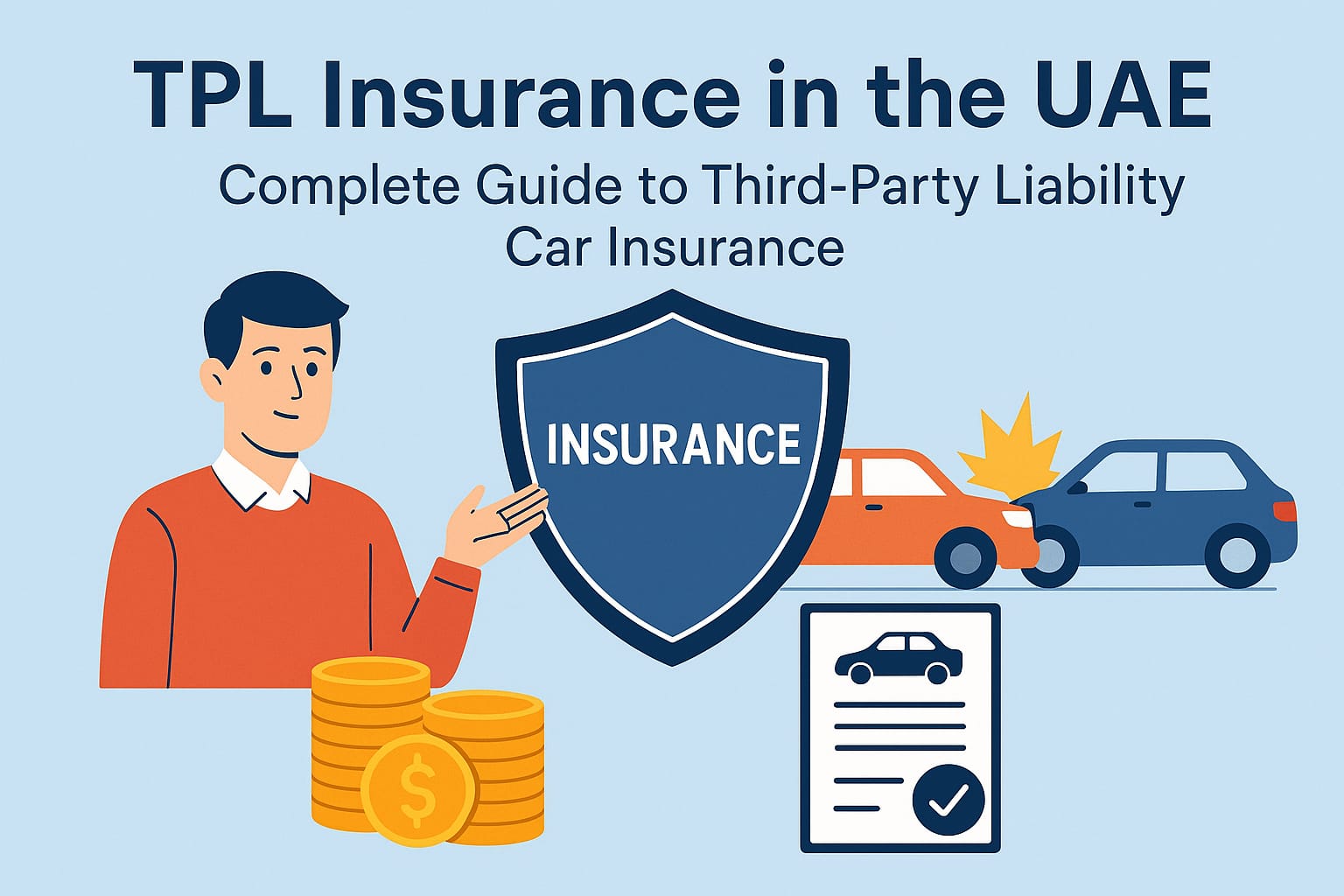Losing a loved one is never easy, and during such a time, handling responsibilities like cancelling car insurance might not be at the forefront of your mind. However, it’s important to know what happens to car insurance when the policyholder dies and the steps that need to be taken to avoid any legal or financial complications.
In the UAE, specific procedures must be followed to manage car insurance policies after the policyholder’s death. Non-compliance with UAE insurance laws could result in fines or legal issues, including the invalidation of the insurance policy, which may leave the vehicle uninsured and lead to further liabilities.
Let’s explore what happens next and how you can handle it effectively.
Car insurance after the death of the policyholder
When the policyholder dies, the car insurance policy doesn’t automatically expire, but certain steps must be taken depending on the situation. The coverage continues, but there are rules about who can use the vehicle, how the policy can be cancelled, and what happens to any claims or outstanding issues.
Here’s what you should know about car insurance when the policyholder dies:
- Car must be insured and transferred: In the UAE, car insurance laws require that the vehicle be insured and legally transferred to a new owner before anyone else can drive it.
- Legal heirs decide the car’s future: If someone dies, the legal heir can determine whether the vehicle should be re-registered or sold.
- Interim Coverage for Ownership Transition: Some insurers in the UAE offer temporary coverage during the transition period. For example, they may provide limited-use coverage for legal heirs or beneficiaries to ensure the vehicle remains insured until ownership is officially transferred.
- Notify the insurance company immediately: It’s essential to notify the insurance company immediately after the policyholder’s death to update the information and avoid complications. Delays in notification can lead to challenges, including delayed claim processing, claim denial, or policy cancellation complications. Additionally, the vehicle may remain uninsured if the policy lapses before notification, leading to potential legal liabilities.
- Deceased’s policy must be cancelled: The deceased’s policy needs to be cancelled. Suppose multiple beneficiaries are listed on the insurance policy. In that case, they may have the right to continue the policy for a limited grace period, often up to three months, depending on the insurer. The coverage remains active to allow ownership transfer or updates during this time.
For policies involving co-drivers, the insurance may remain valid for the co-driver to temporarily use the vehicle, provided they are named on the policy. However, insurers typically require the co-driver or legal heirs to update or transfer the policy into their name within the specified timeframe to ensure compliance with UAE insurance laws.
Procedure for car insurance when the policyholder dies
The process of cancelling the car insurance after the death of the policyholder can vary slightly depending on the insurer and the specific policy. In most cases:
- Notify the insurance company: As stated earlier, the first step is to inform the insurance company about the death. This ensures no further payments or claims are processed under the deceased’s name.
- Provide documentation: The insurer will likely require official documents, such as the death certificate, vehicle registration (mulkiya), and the executor’s details (if applicable).
- Transfer car ownership: To continue driving the car legally, the ownership must be transferred to a family member, spouse, or other legal beneficiaries. At this point, a new insurance policy can be issued under the new owner’s name.
To simplify, if a person passes away in the UAE and is the sole driver listed on the policy, their legal heir would need to cancel their insurance policy after submitting the necessary documents and get a new one under the new owner’s name.
Many insurance companies in the UAE offer dedicated support or assign liaisons to help families handle these sensitive matters. These representatives can guide legal heirs through the documentation process, explain interim coverage, and ensure compliance with local insurance regulations.
What happens to insurance claims when the policyholder dies?
If a policyholder dies while there is an open claim on their car insurance, the claim process will typically continue uninterrupted. Even if the insurance policy is cancelled following the policyholder’s death, the insurer will still work to settle any outstanding claims.
However, any financial responsibilities tied to the claim, such as deductibles or out-of-pocket costs, would generally become the responsibility of the policyholder’s estate (a legal entity that is formed after a person’s death to handle their assets, debts, and overall financial affairs). These costs are paid using the estate’s assets, which include any property, funds, or other valuables left behind by the deceased. The executor of the estate is responsible for ensuring that these costs are settled, either directly with the insurer or through the settlement of the claim.
It’s important for the family or the executor of the estate to remain in contact with the insurance company during the process to ensure smooth handling of the car insurance when the policyholder dies.
Most UAE insurers offer dedicated customer service representatives or liaisons to assist families with policy cancellations, ownership transfers, and claims processing. While support services are generally standardised across insurers under UAE regulations, the extent of assistance can vary depending on the insurer’s specific policies.
Can you drive the car after the policyholder’s death?
In the UAE, it’s essential to ensure that both the vehicle ownership and insurance policy are updated before driving a car after the policyholder passes away. A new insurance policy must be arranged in the new owner’s name, whether it’s a family member or a beneficiary, and the car must be transferred into their name.
Driving without updated insurance is illegal, and failing to complete these steps could result in fines or other legal consequences. Always confirm that the registration and insurance are valid before using the vehicle on the road.
Final takeaway
When dealing with car insurance after the policyholder’s death, it’s important to quickly manage the insurance and vehicle ownership to avoid legal or financial complications. In the UAE, the car must remain insured, and ownership must be transferred to a legal heir or beneficiary. Ensuring the insurance company is notified promptly, the correct documentation is provided, and a new policy is issued under the new owner’s name is crucial.
Maintaining close contact with the insurer and ensuring all documentation is legally up to date allows the vehicle to be used without incurring fines or legal consequences. Additionally, legal advisors and insurance consultants in the UAE who specialise in estate management can offer valuable guidance to families, helping them easily navigate complex insurance and ownership transfer processes.
Remember, handling these matters swiftly and with the right support can save a lot of stress down the road.
Frequently Asked Questions (FAQs)
Do I need a new policy if I inherit the car?
Yes, if you inherit the car, you must cancel the deceased policyholder’s insurance and get a new policy in your name. The car’s ownership must also be transferred to you before the insurance can be updated.
How long does car insurance stay active after the policyholder dies?
Car insurance generally remains active for a short period after the policyholder’s death, allowing the family time to transfer ownership and update the policy. However, it’s important to notify the insurance company immediately and clarify the exact terms.
What documents are needed to update the policy?
To update car insurance when the policyholder dies, you will typically need the death certificate, the vehicle registration (mulkiya), and proof of your legal right to inherit or transfer the vehicle (executor’s details or legal heir documentation).
What happens if a policyholder dies in the UAE in an accident when it is the driver’s fault?
If a policyholder dies in an accident that was the driver’s fault, a compensation payout of up to AED 200,000 is given.
What if the third party is at fault, and the policyholder dies in the accident?
If the third party is at fault, the UAE court may award blood money (Diya), set at AED 200,000, to the deceased policyholder’s family as compensation. The process starts with a police investigation to determine fault, followed by a court review of the evidence and report. Once liability is confirmed, the at-fault party’s insurer typically pays the Diya amount through their third-party liability coverage. The family must submit the required documents, such as the court judgment and death certificate, to process the claim. In some cases, the court may also award additional compensation for emotional or financial damages.
What happens when the car loan holder dies?
If the policyholder had a car loan, the outstanding loan must be settled before transferring ownership. The family or estate will generally be responsible for paying off the loan unless specific life insurance or loan protection policies are in place. The ownership and insurance can only be transferred to a new owner after the loan is cleared.






